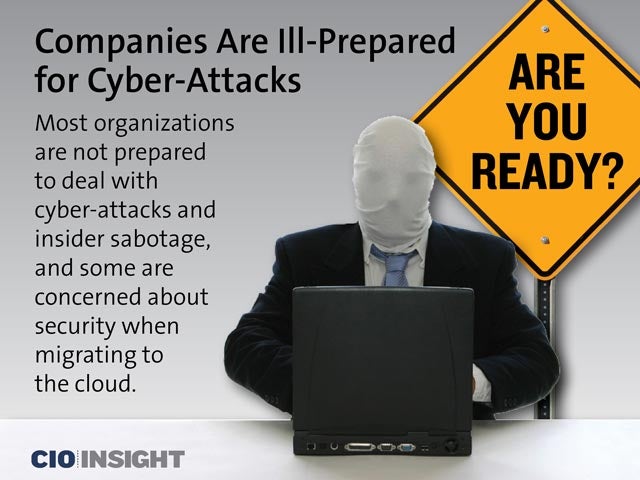
Companies Are Ill-Prepared for Cyber-Attacks
 Companies Are Ill-Prepared for Cyber-Attacks
Companies Are Ill-Prepared for Cyber-Attacks
Most organizations are not prepared to deal with cyber-attacks and insider sabotage, and some are concerned about security when migrating to the cloud.
 Top Cyber-Threats
Top Cyber-Threats
Outsider attack: 43%,
Data vulnerability: 38%,
Insider sabotage: 35%,
User errors: 35%,
Phishing: 35%
 Security Concerns About the Cloud
Security Concerns About the Cloud
Security of data in transit: 66%,
Security of data at rest: 60%,
Security of backups and snapshots: 54%,
Increased attack surface: 53%
 Secondary Cloud Security Issues
Secondary Cloud Security Issues
Lack of visibility: 51%,
Lack of policies: 41%,
Access from unauthorized devices: 34%
 Job Concerns
Job Concerns
66% of the IT decision-makers surveyed worry that they will lose their jobs because of security issues.
 Concerns About Monitoring the Cloud
Concerns About Monitoring the Cloud
47% of IT professionals are unable to monitor workloads across clouds. 44% agree, or strongly agree, that there is insufficient network control and monitoring in the cloud.
 Managing Security of Hybrid Clouds
Managing Security of Hybrid Clouds
Seven out of 10 IT decision-makers said they are concerned, or completely concerned, about managing the security of hybrid infrastructures.
 Worry About Financial Compensation
Worry About Financial Compensation
73% of respondents worry about the financial compensation their company might have to pay as a result of a security breach.
 New Technologies Can Help
New Technologies Can Help
Because the cloud and hybrid infrastructure adoption pose unknown security challenges, CIOs must prevent zero-day exploits, advanced persistent threats (APTs), and other cyber-crimes by adopting breakthrough technologies.
 Analyze Your Data
Analyze Your Data
When opting for a hybrid cloud solution, perform an analysis of the type of data your organization handles and evaluate it based on its sensitivity.
 What to Keep In-House
What to Keep In-House
Store critical, personal and private data related to intellectual property in-house, and only give access to authorized personnel.
 Use Many Authentication Mechanisms
Use Many Authentication Mechanisms
All types of data access should be done via multiple authentication mechanisms. These should involve more than just user names and passwords. Two-factor or biometric data can offer additional safeguards.